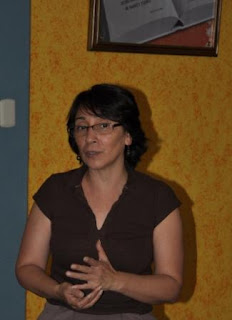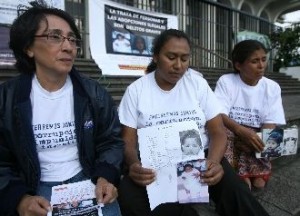(more to come, including photos)
At the beginning of the day, MIA received visits from two surviving parents of murdered women. The first parent who visited us was Rosa Franco, whose daughter Maria Isabel was killed in 2001, at age 16. Maria Isabel worked in a clothing store and noticed a man that seemed to have been stalking her on numerous occasions. One night, leaving from work, she was abducted and forced into a car, and was severely beaten, raped, and left in a ditch to die.
Maria Isabel, a beautiful young woman, enjoyed wearing makeup and cute clothing. This, according to the public defense attorney, meant that she must have been a prostitute. After over a year of frustrating attempts to further her daughter’s case, Amnesty International helped Franco get her case into the InterAmericas Court. While Franco says that Amnesty International was helpful pushing her case, she said that that the IAC had its own special political interests connected to Guatemala and thus failed to push a legitimate investigation of her daughter’s murder. As a result of Franco’s determination to obtain justice for Maria Isabel, she has been subjected to various threats and the IAC has provided her family with its own security. Without any satisfactory progress to note, Franco is still trying to push her daughter’s investigation, much to the displeasure of the Guatemalan government, she noted.
Shortly after, Jorge Velazquez met with MIA to discuss the murder of his daughter Claudina, who was raped and murdered while walking home from a party. In a similar fashion to Maria Isabel’s case, Claudina’s murder was delegitimized by the police and the public defense attorney. They insisted that she must have been a prostitute due to the facts that she was wearing sandals, a choker necklace, had a navel piercing, and her body was found in a middle class neighborhood. Consequently, as a “prostitute,” her case was not worth investigating.
Claudina’s fingerprints were not taken at the crime site or at the morgue. The police immediately covered her body, even before the crime scene investigators arrived. There were also major discrepancies surrounding her time of death. Velazquez has been trying to push his daughter’s investigation for several years to no avail, but believes that his daughter’s brutal murder is a result of the reality that narcotic traffickers often use women as tools in their transactions, what is believed to be a major factor of violence against women in the country. While Velazquez and his family have not been able to obtain justice to perhaps ease the healing process, he aspires for a Guatemala in which impunity does not exist to further the pain that families of victims of violence must endure.
The personal testimonies of Rosa Franco and Jorge Velazquez left a heavy air in the room; several of us were in tears. Such tragic accounts, however discouraging as we realized the magnitude of impunity that too often overpowers women’s cases, gave us even further inspiration for the cause to which we have become dedicated.
MIA then visited San Carlos University, the last public university in Guatemala. Randi and Jenny, who are long-time friends of MIA, gave us a presentation along with the rest of their on-campus activist group, Collectivo Rogelia Cruz. Giving a thorough and accurate history of the country, they discussed the military coup in 1951 that was aided by the United States and put Jacob Arbenz in power, leading to the 30-year old civil war that began in 1960 and, despite the signing of peace accords in 1996, continues to haunt Guatemala. The group also presented on the student movement that arose in the 60’s and 70’s as a result of the massive inequalities that ensued as a result of war and contributed to society’s overall resistance to the political climate. As the student movements began at this very university, Collectivo Rogelia Cruz gave us a tour of the incredible murals around campus that serve as both intricate works of art and heartfelt accounts of the country’s history.











 Proud Founder Member of the Guatemala Peace and Development Network
Proud Founder Member of the Guatemala Peace and Development Network